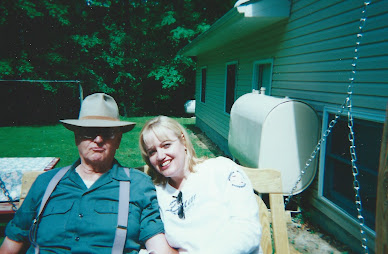Archie Davis first appeared in Hemlock Hollow in the late 1930s. Where he came from, nobody ever knew. However, it was rumored that he had come from Bingham Center. He lived in the empty barn on the old Charlie Day farm four miles from town. After living there for several years, the barn was torn down, so he moved into an old granary with a few boards over the one corner for shelter. He had a few heads of goats that he milked and ate. That is how he got the name of the "Goat Man". Some claimed Archie was an Indian because his face was smooth and he didn’t shave.
Archie would come to town once a month with a grain sack to carry home his monthly supplies. The general store owners, Stanley and Helen Pearsall, told me that in the wintertime Archie would arrive around 8:00 a.m., about an hour after the store had opened. He would stand for hours in the same spot without changing his position or saying a word to anyone. About 4:00 p.m. he would start home on foot, carrying his supplies in the sack slung over his shoulder. His monthly supplies were always the same and always ordered in the following order: 3 packages of Red Man chewing tobacco, 3 boxes of unsalted soda crackers, oatmeal, and two or three other small items.
Archie would come to town once a month with a grain sack to carry home his monthly supplies. The general store owners, Stanley and Helen Pearsall, told me that in the wintertime Archie would arrive around 8:00 a.m., about an hour after the store had opened. He would stand for hours in the same spot without changing his position or saying a word to anyone. About 4:00 p.m. he would start home on foot, carrying his supplies in the sack slung over his shoulder. His monthly supplies were always the same and always ordered in the following order: 3 packages of Red Man chewing tobacco, 3 boxes of unsalted soda crackers, oatmeal, and two or three other small items.
After Archie had lived there several years, one summer day a nice Cadillac drove up in front of the store. A nicely dressed woman came into the store. She told Stanley that she lived in Wellsville, NY and was Archie Davis’ sister. She told him that if Archie ever needed anything to give it to him and then send her the bill. Stanley said that Archie never used that privilege.
The townspeople always believed Archie would be eaten up by his dogs since all they had to eat was what they could find in the woods. Hunters told that when they killed a deer and dragged it out, the dogs would follow their track, back to where they had killed and gutted the deer, and then eat the innards. Some of Archie’s dogs’ mouths were full of porcupine quills. The game commissioner came one year and shot 33 dogs that had no license.
After many years of living up Hemlock Hollow in very poor conditions, Archie moved to Coneville. He lived there three or four years in an old chicken house just west of where Torrey’s Cheese, Ice Cream and Pizza Shop are now. Rev. David Derk, pastor of Oswayo and Coneville at the time, had made friends with Archie when he lived in Hemlock Hollow. One day he stopped in to see Archie in Coneville and found him dead.
--Darell
This story from Dad's trove of memories awakens some of my own memories. As young children, visiting during the summer, my grandparents would take us for Sunday drives on the back roads of Potter County. Occasionally, we would drive past the Goat Man's place up Hemlock Hollow and they would tell us how he lived alone out in the woods. We would peer out the windows in hopes of seeing him or his goats. I don't think we ever saw him (he may have moved by then), but it was always a marvel to me how someone could survive without anyone else around.
"A friend loves at all times. They are there to help when trouble comes." Proverbs 17:17 (NIRV)
"A friend loves at all times. They are there to help when trouble comes." Proverbs 17:17 (NIRV)
--Jan
ARE YOU FOLLOWING US, YET?
If not, please do so by clicking the little blue follow button at the top left of our blog. If you are reading on a phone, you may need to switch it to "view web version" to find the follow button. Thanks!










